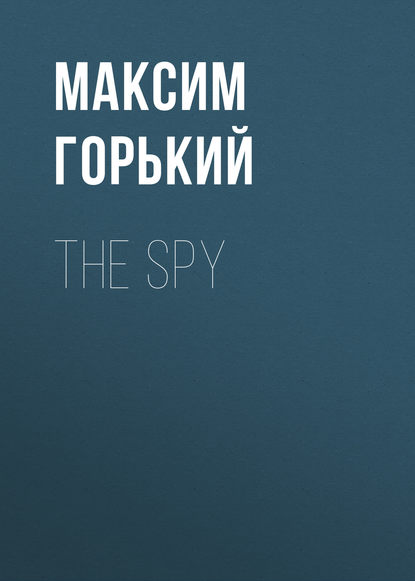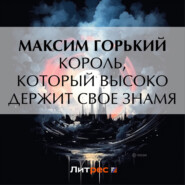По всем вопросам обращайтесь на: info@litportal.ru
(©) 2003-2024.
✖
The Spy
Настройки чтения
Размер шрифта
Высота строк
Поля
Maklakov turned and walked away without answering. Yevsey involuntarily followed him.
"Did you understand anything?" Maklakov suddenly inquired of Yevsey.
"I don't like it."
"No? Why?"
"He's always rancorous, and there's rancor enough without him."
"Yes, so there is," said Maklakov, nodding his head. "There's rancor enough."
"And it's impossible to understand anything," Klimkov continued, looking around cautiously. "Everybody speaks differently – "
The words had scarcely left his mouth when he grew alarmed, and glanced sidewise at Maklakov's face. The spy pensively brushed the dust from his hat with his handkerchief, apparently oblivious of the dangerous words.
"Well, good-by," he said, holding out his hand to Yevsey. Yevsey wanted to accompany him, but the spy put on his hat, and twirling his mustache, walked out without so much as looking at him.
CHAPTER XXV
Something strange, like a dream, grew in the city, rushing onward with irresistible rapidity. People lost their fear completely. On the faces which only a short time ago had been flat and humble, an expression of conscious power and preoccupation now appeared sharply and clearly. All recalled builders preparing to pull down an old structure, and busily considering the best way of beginning the work.
Almost every day the workingmen in the factory suburb openly arranged meetings, at which known revolutionists appeared, who in the very presence of the police and officials of the Department of Safety sharply censured the order of life, and pointed out that the manifesto of the minister convoking the Duma was an attempt of the administration to pacify the people, who were stirred up by misfortune, in order to deceive them in the end, as always. The speakers urged their listeners not to believe anybody except their own reason.
Once when a rebel orator shouted, "The people alone are the true and legal masters of life; to them belong the whole earth and all freedom," a triumphant roar came in reply, "True, brother!"
Yevsey deafened by the shouts turned away, and met Melnikov who had been standing in back of him. His eyes burned, he was black and dishevelled. He flapped his arms, as a crow flaps its wings, and bawled:
"Tr-r-r-ue!"
Klimkov pulled the skirt of his coat in amazement, and whispered in a low voice:
"What ails you? The speaker is a Socialist. He's under surveillance."
Melnikov blinked his eyes, and asked:
"He?" Without awaiting a reply, he shouted again, "Hurray! True!" Then to Yevsey very angrily, "Get out! It's all the same who speaks the truth."
Yevsey smiled timidly at the new speeches. He looked around helplessly for some person in the crowd with whom he might speak openly; but on finding a pleasant face that inspired confidence, he sighed and thought:
"I'll begin to talk with him, and he'll at once understand that I'm a spy."
He frequently heard the revolutionists speak of the necessity of arranging another life upon earth. Dreams of his childhood returned, broadened and filled with a clear content. He believed in the hot fearless words. But the faith grew feebly and lazily upon the shaky, slimy soil of his soul, choked with impressions, poisoned by fear, and exhausted by violence. His faith was like a child suffering with rachitis, bow-legged, with large eyes always gazing into the distance.
Yevsey admired the beautiful growth of the rebellion. But he lacked the power to fall in love with it. He believed words. He did not believe people. The dreams stirring his heart died the instant they touched it. A timorous spectator he walked along the shore of a stream without the desire to plunge into its soul-refreshing waves. At the same time he longed wistfully for someone to triumph, for someone to make life calm and pleasing, and point out a comfortable place in it where he might find repose.
At first he could not comprehend why both the revolutionists and the officers of the spies censured the administration, why both asserted that someone wanted to deceive the people. When the people themselves, however, came out into the street, and began to speak, Yevsey stopped to think about this question.
The spies walked about slowly, indolently; they all grew strange to one another, maintaining sullen silence, and looking into the eyes of their comrades suspiciously, as if expecting something dangerous from one another. The officials ceased to talk, and sank into the background. They gave out no plans of action, and said nothing new.
"Has nothing been heard in regard to this St. Petersburg league of princes?" Krasavin asked almost every day.
Once Piotr joyously announced:
"Boys, Sasha has been summoned to St. Petersburg. He'll fix up a game there, you'll see."
Viakhirev, the hook-nosed, reddish spy, remarked lazily:
"The League of Russian People has been permitted to organize fighting bands to kill the revolutionists. I'll go there, I'm a good shot."
"A pistol is a fine thing," said someone. "You shoot, and then run away."
"How simply they speak about everything," thought Yevsey. He involuntarily recalled other conversations – Olga and Makarov – which he impatiently pushed away from himself.
Sasha returned from St. Petersburg, as it were stronger. Concentrated green sparks gleamed in his dim eyes. His voice had become deeper, his entire body seemed to have straightened and grown sounder.
"What are we going to do?" asked Piotr.
"You'll soon find out," answered Sasha, showing his teeth.
Autumn came as always quiet and melancholy. But the people did not remark its advent. Yesterday bold and noisy, to-day they came out into the streets still bolder, still more confident, and upheld Yevsey's faith in their victory, in the nearness, of a calm, peaceful, comfortable life.
Then came the fabulously terrible and marvellous days, when all the people ceased to work, and the customary life that for so long had held oppressive sway, oppressive in its cruelty and aimless play, suddenly ceased, as if crushed by a giant embrace. The people refused the city, their ruler, bread, fire, and water. And for a number of nights it stood in darkness, hungry, thirsty, sullen, and affronted. During those dark, insulting nights, the working-people walked through the streets with song, childish joy shining in their eyes. For the first time they clearly saw their power, and themselves were amazed at its significance. They understood their might over life, and good-naturedly exulted, looking at the blinded houses, the motionless dead machines, the dumbfounded police, the closed, ever-hungry jaws of the shops and restaurants, the frightened faces, the humble figures of those persons who had never learned to work, but only to eat much, and who therefore considered themselves the best blood in the city. Their power over people had been torn from their impotent hands in these days, yet their cruelty and cunning remained. Klimkov looked at the men accustomed to command now silently submitting to the will of the hungry, poor, and unwashed. He understood that it had become a shame for the lords to live. So trying to cover up their shame, they smiled approvingly upon the working-people, and lied to them. They were afraid of the workers. In spite of the lords, however, it seemed to Yevsey that the past would not return. He felt that new masters had arisen, and if they had been able all of a sudden to stop the course of life, then they would now be able to arrange it differently, more freely, and more easily for themselves and for all.
The old, the cruel, and the malicious abandoned the city. It melted away in the darkness. The people perceptibly grew better, and though the city remained without illumination, yet the nights were stirring, merry as the days.
Everywhere crowds of people gathered and spoke animatedly, in free, bold, human speech, of the approaching days of the triumph of truth. They believed in it hotly. The unbelievers were silent, but looked into the new faces, impressing the new speech upon their minds.
Often Klimkov observed the spies in the crowds. Not wishing to be seen by them, he walked away. He met Melnikov more frequently than the others. This man roused his particular interest. A dense crowd always gathered around him, and his thick voice flowed from the centre of the group like a dark stream.
"There, you see! The people wanted it, and everything is up. If the people want it, they will take everything into their own hands. They're a power, the people are. Remember this – don't let what you have obtained slip from your grasp. Take care! More than everything, guard against the cunning of various gentlemen. Away with them. Drive them off! If they dispute, beat them to death."
When Klimkov heard this, he thought:
"For such talk people used to be put in prison. What numbers have been put in prison! And now they speak that way themselves."
He wandered about in the crowd alone from morning until late at night. Sometimes he had an irresistible yearning to speak; but as soon as he felt the desire coming upon him, he immediately walked off into empty by-streets and dark corners.
"If I speak, they'll recognize me," he thought with importunate dread. And he comforted himself by reflecting, "No hurry. I'll have time enough yet to speak."
One night while walking along the street, he saw Maklakov hidden in a gateway, looking up to a lighted window on the opposite side of the street like a hungry dog waiting for a sop.
"Keeps at his work," thought Yevsey, then said to Maklakov: "Do you want me to take your place, Timofey Vasilyevich?"
"You, me, Yevsey?" exclaimed the spy in a subdued voice, and Klimkov felt that something was wrong, for it was the first time that the spy had ever addressed him by the first name. Moreover Maklakov's voice was not his own. "No, go," he said.
The spy always so smooth and decorous now had a shabby appearance. His hair, as a rule carefully and prettily combed behind his ears, lay in disorder over his forehead and temples. He smelt of whiskey.
"Good-by," said Yevsey raising his hat and walking off slowly. He had taken only a few steps, however, when he heard a call behind him.

















